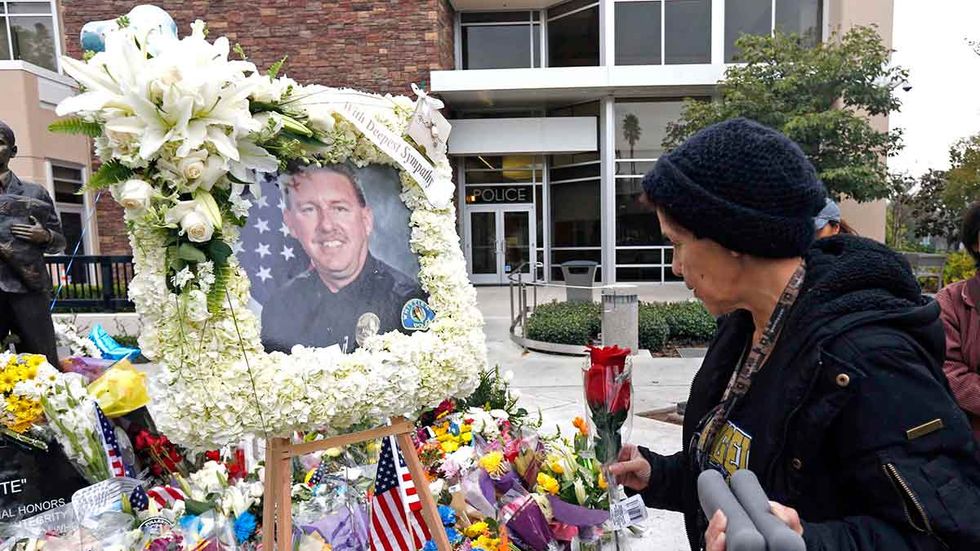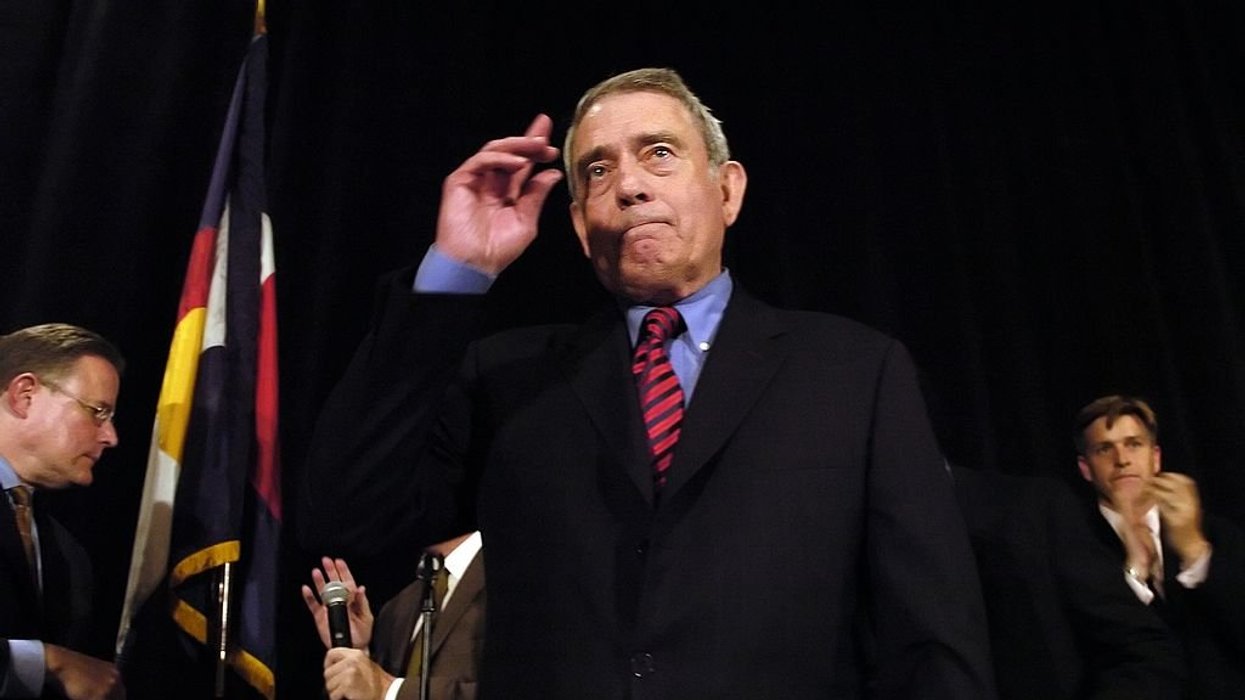
© 2024 Blaze Media LLC. All rights reserved.
Over the past few weeks, we have chronicled how the courts have bastardized fundamental rights, inverted state and federal powers, redefined marriage and sexuality, and erased our national sovereignty.
One of the old pastimes of the courts has been to interfere with state or federal criminal justice procedures that have been in place for years, resulting in colossal public safety concerns. Sadly, one of those chickens came home to roost this week in Los Angeles where a cop was killed by a known, violent criminal set free thanks to court-mandated legislation.
Michael Christopher Mejia is suspected of killing Whittier, California policeman Keith Boyer during a shootout in east Los Angeles on Monday. What is so tragic about this case is that Mejia was arrested five times over the past seven months during a probation program that was borne out of a 2011 court decision. He served only two years for a robbery conviction in 2014 and has been allowed to roam free despite five parole violations since 2016 because he had been deemed a “non-violent” offender. And who would want to fill up prisons with such peaceful denizens?
In Brown v. Plata (2011), Justice Anthony Kennedy wrote a 5-4 decision asserting that his subjective view of overcrowding in California’s prison system (exacerbated by illegal aliens, by the way) violates the Eight Amendment. The court, therefore, required the state to engage in a massive jailbreak.
Needless to say, the liberal politicians in the state were eager to capitalize on this ruling. Much like Anthony Kennedy redefined marriage to comport with his personal views, he redefined the Eighth Amendment — as a living and breathing amendment — resulting in the release of at least 46,000 prisoners.
This is part of a growing trend whereby judges codify their political agenda for loosening crime statutes into the Constitution. Judges have already invalidated life in prison without parole for juvenile murderers, have invalidated a number of criminal statutes both at the state and federal level, and are now creating an arbitrary constitutional class of non-violent offenders, just like Mejia!
At the time, Justice Samuel Alito dissented due in part to public safety concerns, citing a prisoner release program carried out in Philadelphia in the 1990s:
Although efforts were made to release only those prisoners who were least likely to commit violent crimes, that attempt was spectacularly unsuccessful. During an 18-month period, the Philadelphia police rearrested thousands of these prisoners for committing 9,732 new crimes. Those defendants were charged with 79 murders, 90 rapes, 1,113 assaults, 959 robberies, 701 burglaries, and 2,748 thefts, not to mention thousands of drug offenses.
— Alito, J., dissenting, slip op. at 14
Justice Scalia lampooned Kennedy in a scathing dissent (joined by Justice Thomas), in which he spent nine minutes reading it from the bench and called Plata, “perhaps the most radical injunction issued by a court in our nation’s history.” (Although, that was before the injunction on marriage and national sovereignty that took place recently!)
Today the Court affirms what is perhaps the most radical injunction issued by a court in our Nation’s history: an order requiring California to release the staggering number of 46,000 convicted criminals.
There comes before us, now and then, a case whose proper outcome is so clearly indicated by tradition and common sense, that its decision ought to shape the law, rather than vice versa. One would think that, before allowing the decree of a federal district court to release 46,000 convicted felons, this Court would bend every effort to read the law in such a way as to avoid that outrageous result. Today, quite to the contrary, the Court disregards stringently drawn provisions of the governing statute, and traditional constitutional limitations upon the power of a federal judge, in order to uphold the absurd.
The proceedings that led to this result were a judicial travesty. I dissent because the institutional reform the District Court has undertaken violates the terms of the governing statute, ignores bedrock limitations on the power of Article III judges, and takes federal courts wildly beyond their institutional capacity.
Sadly, most legal eagles on the Right have been overcome by a strain of libertarianism that actually champions this sort of social transformation from the bench. Federal or state sovereignty, and national security be damned. Amazingly, they want to pass “criminal justice reform” to give the courts even more — not less— power over criminal law.
When reading Scalia’s writings, one is jolted by the degree of common sense, history, and tradition that he used to complement the original meaning of the Constitution and the role of the courts. All of that is lost in today’s judiciary, including much of the right-leaning legal profession. It would be nice to see if Neil Gorsuch shares this same character trait of Scalia, given the wide support for him among legal libertarians. We could add it to our long list of unanswered questions and unknowns about the next Supreme Court pick.
The growing trend of court involvement in criminal justice policy is one of the worst manifestations of social transformation without representation whereby they are violating state sovereignty, congressional statutes, and the underpinnings of the social compact. Even if Gorsuch turns out to be good on these issues, the Left already has an impervious five-seat firewall. And Roberts is also unreliable. Yesterday, the Supreme Court stayed an execution on ridiculous grounds and only Thomas and Alito dissented. They bulldozed settled law, criminal statutes, and state plenary procedures, as they did last year when staying executions in Georgia and Pennsylvania.
Sadly, there will probably be a lot more murders of cops and civilians at the hands of judicially mandated jailbreak before Congress protects state legislatures from the federal courts.
Want to leave a tip?
We answer to you. Help keep our content free of advertisers and big tech censorship by leaving a tip today.
Want to join the conversation?
Already a subscriber?
Blaze Podcast Host
Daniel Horowitz is the host of “Conservative Review with Daniel Horowitz” and a senior editor for Blaze News.
RMConservative
Daniel Horowitz
Blaze Podcast Host
Daniel Horowitz is the host of “Conservative Review with Daniel Horowitz” and a senior editor for Blaze News. He writes on the most decisive battleground issues of our times, including the theft of American sovereignty through illegal immigration, theft of American liberty through tyranny, and theft of American law and order through criminal justice “reform.”
@RMConservative →more stories
Sign up for the Blaze newsletter
By signing up, you agree to our Privacy Policy and Terms of Use, and agree to receive content that may sometimes include advertisements. You may opt out at any time.
© 2024 Blaze Media LLC. All rights reserved.
Get the stories that matter most delivered directly to your inbox.
By signing up, you agree to our Privacy Policy and Terms of Use, and agree to receive content that may sometimes include advertisements. You may opt out at any time.



